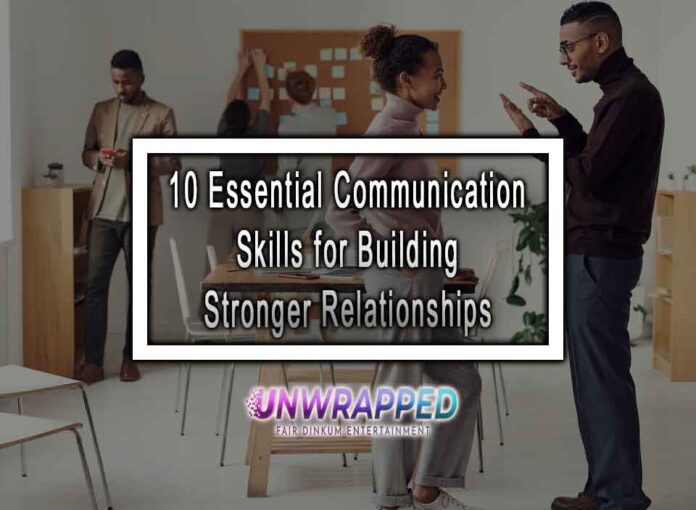Enhance Your Relationships with Effective Communication Skills
Communication is the key to any successful relationship, be it with your partner, family members, friends, or colleagues. Having strong communication skills not only helps you express yourself clearly but also enables you to understand others better. In this listicle, we’ll explore ten effective communication skills that can significantly improve your relationships. Whether you’re looking to deepen your romantic connection, foster stronger friendships, or enhance teamwork at the office, these skills will empower you to build healthier and more fulfilling relationships.
1. Active Listening: The Art of Hearing Beyond Words
Effective communication involves more than just speaking; it requires active listening. Practice giving your undivided attention, maintaining eye contact, and using verbal and non-verbal cues to show that you are fully engaged in the conversation. Active listening allows you to understand others’ perspectives and feelings, fostering empathy and strengthening your bonds.
2. Empathy: Understanding and Sharing Emotions
Cultivating empathy involves putting yourself in someone else’s shoes and seeking to understand their emotions and experiences. By acknowledging and validating their feelings, you create an environment of trust and support. Empathy helps bridge gaps and resolve conflicts by fostering understanding and connection.
3. Clear and Concise Communication: Say What You Mean
Expressing yourself clearly and concisely is crucial for effective communication. Avoid beating around the bush or using ambiguous language. Be direct and specific, using assertive yet respectful communication to articulate your thoughts, needs, and boundaries. Clear communication reduces misunderstandings and promotes healthy dialogue.
4. Non-Verbal Communication: Beyond Words
Non-verbal cues, such as facial expressions, body language, and tone of voice, can convey emotions and intentions even when words fall short. Pay attention to your non-verbal communication and be receptive to others’. By aligning your words with your body language, you enhance the clarity and impact of your message.
5. Conflict Resolution: Navigating Differences with Respect
Disagreements and conflicts are inevitable in any relationship. Developing conflict resolution skills involves actively listening, expressing your viewpoint calmly, and seeking common ground. Emphasize finding solutions rather than assigning blame. Effective conflict resolution strengthens relationships by promoting understanding and compromise.
6. Mindful Communication: Engaging with Awareness
Mindful communication involves being fully present in the moment and consciously choosing your words and actions. Avoid distractions and practice active listening, empathy, and self-awareness. Mindfulness fosters deeper connections, reduces misunderstandings, and enhances the quality of your interactions.
7. Feedback and Constructive Criticism: The Art of Giving and Receiving
Constructive feedback is essential for personal and professional growth. When offering feedback, be specific, focus on behavior rather than personality, and provide suggestions for improvement. Similarly, be open to receiving feedback and view it as an opportunity for self-improvement. Constructive criticism strengthens relationships by promoting growth and mutual understanding.
8. Flexibility and Adaptability: Embracing Change
Relationships evolve over time, and being flexible and adaptable is crucial for their sustainability. Embrace change, be open to new perspectives, and show willingness to compromise. By demonstrating flexibility, you create an environment that encourages growth, exploration, and mutual support.
9. Conflict Management: Turning Challenges into Opportunities
Instead of avoiding conflicts, approach them as opportunities for growth and understanding. Establish open lines of communication, seek common ground, and work collaboratively to find mutually beneficial solutions. Effective conflict management fosters resilience and strengthens the bond between individuals.
10. Emotional Intelligence: Nurturing Self-Awareness and Others’ Feelings
Emotional intelligence involves understanding and managing your emotions and recognizing and empathizing with others’ emotions. By cultivating self-awareness, emotional regulation, and empathy, you can navigate relationships more effectively, respond thoughtfully, and foster deeper connections.
Strengthen Your Relationships with Effective Communication
Effective communication skills form the foundation of healthy and thriving relationships. By honing your active listening, empathy, clarity, and conflict resolution skills, you can foster deeper connections, resolve conflicts amicably, and build stronger bonds with your loved ones, friends, and colleagues. Incorporate these essential communication skills into your interactions, and watch as your relationships flourish and grow. Remember, communication is not just about talking; it’s about truly connecting and understanding others.
Revealed: Accepting Change: 10 Ways to Navigate Life’s Transformations










